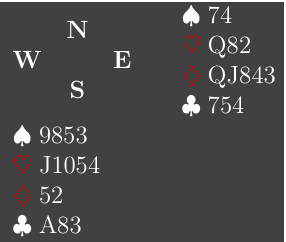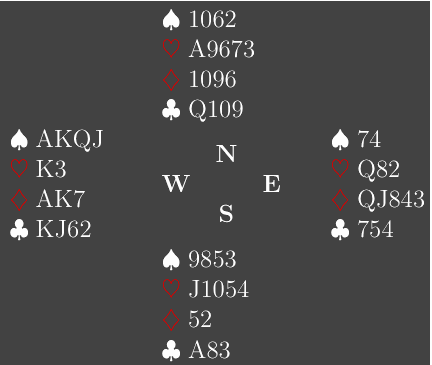
The solution to yesterday’s problems. The first hand.

You hear a strong 2♣ on your left, 2♦ on your right, 3NT on your left showing 27-28 balanced, 6NT. Partner leads the ♦10 to declarer’s ♦A.
Declarer now plays the ♥K and a ♥ to the Q, partner showing an even number of hearts, back to ♦K and 3 more rounds of ♦ follow. Your partner started with 3 diamonds and discards a heart and a spade on the diamonds, declarer throws 2 small clubs. Next comes the ♣4. Your play and if you win the ace, what do you play next?
Time to count some points (well, you should have done this earlier, if you break tempo, it is now too late): dummy has 5, you have 5, assuming 27-28 with declarer that leaves 2-3 for partner or a K or Q at most. Declarer has shown ♦AK and ♥AK. Well, that gives declarer something like ♠AKQ, ♥AKxx, ♦AKx, ♣KJxx and he’d now be down to a club guess. So, you duck smoothly and hope he gets it wrong. Declarer wins the K and claims: 2 hearts, 5 diamonds, 4 spades and 1 club makes 12, the full hand being something like this.

Oops, that wasn’t too clever to duck all those tricks.
Any alternatives? I don’t see any. Declarer won’t have finesse position in spades, otherwise he’d not waste one of his red suit entries and if partner has the ♥A, he’d probably go up with it as this is the only high card held by the defence.
The hand is one of the director’s calls from last week’s transnationals. In practice, west first forgot the system and though he had a 23-24 NT, that can happen. Then partner broke tempo twice when the ♥K and ♥Q were played. South now didn’t have a problem to rise with the ♣A and return a heart for down one. Director!
We gave the hand to a number of good players from other events. 4 or 5 ducked the trick, 4 others went up with the ♣A and returned a black suit. Winning the ♣A and returning a heart was not mentioned by anybody. Time to adjust to 6NT making.

On this hand, you reach 6 ♦, with a 2♥ overcall on your left and a raise to 4♥ on your right. The ♥A is led, followed by the ♣4 (3rd/5th), 5, J, A. Now what?
This is probably not the best contract you have ever bid, but you do have a chance: guess the trumps and find the ♠J to set up a club discard. There are some communication problems though, if you decide to play east for K4 of trumps, you have also committed yourself to playing him for ♠Jxx(...). If you play the ♦A, you can still decide what to do with spades. If west shows up with the ♦K, you have a little stronger argument to play east for the ♠J, as ♥AK plus ♦K are a lot of points for a weak overcall. You cash the ♦A and are lucky: ♦K drops, ♠J is in the east hand. Well guessed, but you do consider yourself lucky.
The hand is another appeal. At the table, east explained the 2 overcall to south as exactly 4♠ and 5+♥. That makes quite a difference, with long spades in west, it becomes pretty much automatic to run the ♠10 in trick 2. That is not a success. Later on, declarer misguesses trumps by running the ♦2. After the hand, north points out that west did not alert 2♥ on his side of the screen. When asked, west says that he was not aware of the convention. Yes, they discussed it on the way to the tournament but never agreed this. It is also not on the convention card.
OK, so it is clear that there is no agreement and south has been misinformed. He hasn’t done anything unreasonable by running the ♠10 in trick 3, so he is entitled to some compensation. On the other hand, it seems far fetched to assume he will always get right, in particular since he already got the trumps wrong in practice. Declarer does of course argue that he was already down at that point and didn’t give the trump decision that much thought.
After some discussion, we agree that declarer will make the hand half the time. With the score at the other table, this works out to a 13 imp’s gain half the time, and a 12 imp loss otherwise. That makes it approximately a flat board and we adjust accordingly.
NS are happy with this, EW disagree with vague arguments but realize that an appeal won’t help much as they caused the problem themselves in the first place by not knowing their agreements in a simple situation.
